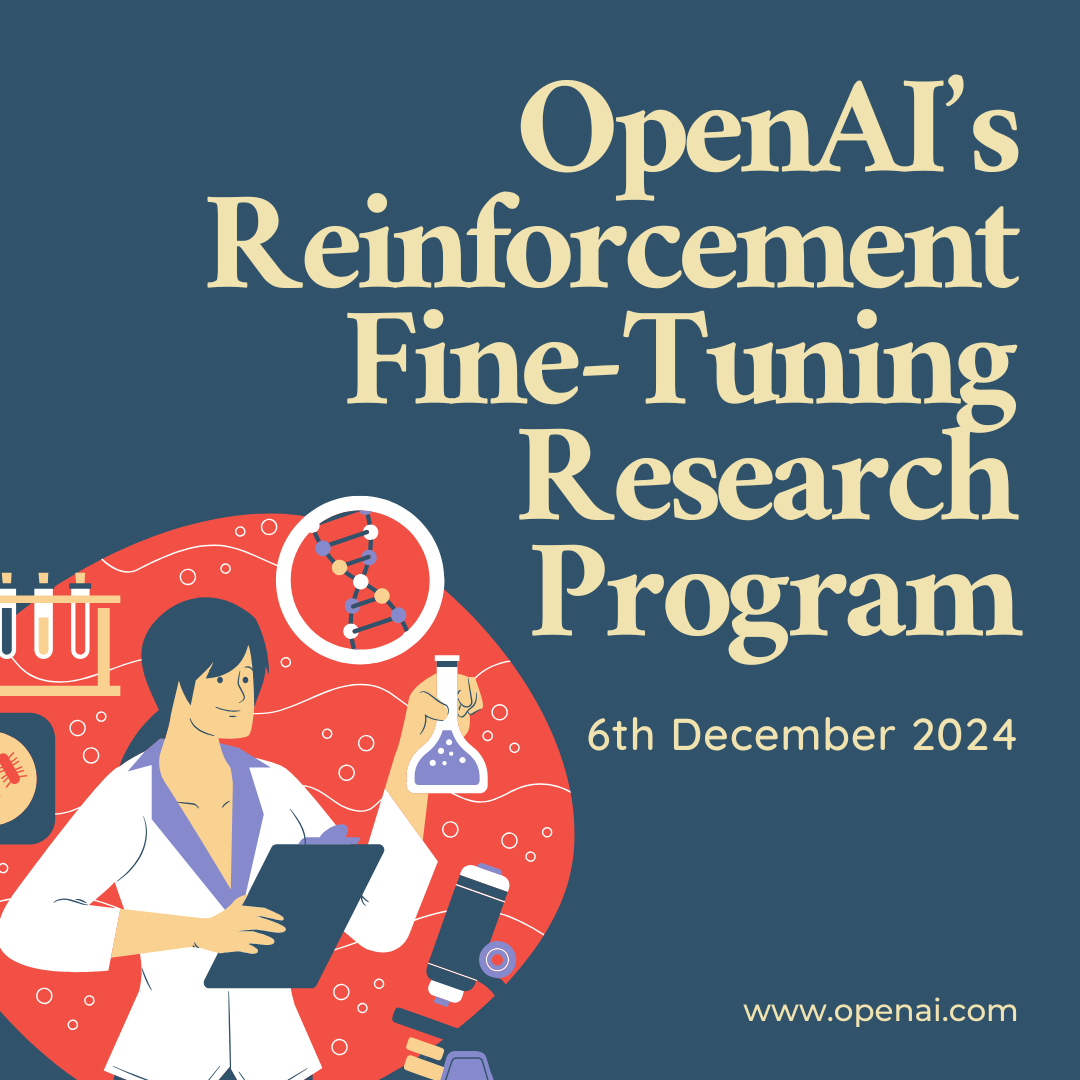OpenAI's Reinforcement Fine-Tuning Research Program - Help Fine-Tuning Models in Your Expert Domain!
Last updated: 2024-12-07
Introduction to OpenAI's Research Program
OpenAI announced expansion of their Reinforcement Fine-Tuning Research Program just yesterday. The tech community buzzed with excitement over the announcement of OpenAI's Reinforcement Fine-Tuning Research Program, discussed extensively on platforms like Hacker News. This program promises to take AI capabilities to new heights by enhancing how models learn from human feedback. With this post, we’ll delve into the details, implications, and the anticipated impact of this innovative approach to training artificial intelligence.

Understanding Reinforcement Learning
Before we explore OpenAI's initiative, let's break down what reinforcement learning (RL) actually is. In simple terms, reinforcement learning is a type of machine learning where an agent learns to make decisions by taking actions in an environment to maximize some notion of cumulative reward. The process involves:
- Agent: The learner or decision-maker.
- Environment: Everything the agent interacts with.
- Actions: Choices made by the agent that affect the state of the environment.
- Rewards: Feedback signals sent to the agent based on its actions.
What sets reinforcement learning apart is that the agent learns from the consequences of its actions, rather than being explicitly taught by a dataset like in supervised learning.
The Theme Behind OpenAI's Program
OpenAI's recent program aims to refine the way reinforcement learning is used by leveraging large language models (LLMs) in conjunction with human feedback. The goal is to create AIs that not only understand but also adapt to nuanced human preferences more effectively. This concept of reinforcement fine-tuning could revolutionize how we train models, moving beyond raw data inputs to incorporating human values and judgments directly into the learning process.
The Importance of Human Feedback
The integration of human feedback in reinforcement learning is crucial because it addresses some of the foundational limitations of traditional RL models. Standard RL systems can often take suboptimal actions in situations where human intuition would naturally guide better decision-making. By imbuing models with human insights, OpenAI aims to nurture a more aligned and reliable AI that resonates with human values and priorities.
During the initial phase of this research program, extensive studies will focus on how to effectively gather and utilize human feedback in a structured and scalable way. This involves developing methods to rate various model outputs based on their alignment with human preferences, ultimately guiding the model towards better performance in real-world scenarios.
Potential Applications of Reinforcement Fine-Tuning
The potential applications of this program are vast and varied. Here are a few key areas where reinforcement fine-tuning could make a significant impact:
- Healthcare: AI could assist in treatment plans, considering patient preferences and outcomes.
- Education: Customized learning paths for students based on their individual needs and responses.
- Customer Service: Enhanced virtual assistants that understand and respond to human emotions and needs.
- Entertainment: AIs in gaming that adapt scenarios based on player feedback, providing a more personalized experience.
Challenges and Ethical Considerations
While the vision for reinforcement fine-tuning is exciting, it is essential to acknowledge the challenges and ethical considerations that accompany such advancements. As AI systems increasingly integrate human feedback, questions surrounding bias, accountability, and transparency become paramount.
One of the biggest challenges lies in ensuring that the human feedback used to train these models is as unbiased and representative as possible. Since models learn from the data they are trained on, any biases present in the training feedback could lead to skewed outputs that might reinforce negative stereotypes or harmful behaviors. This necessitates robust frameworks for monitoring and correcting biases during both the feedback collection and model training phases.
The Future of AI with OpenAI's Initiative
OpenAI's Reinforcement Fine-Tuning Research Program marks a significant step towards a future where AI can coexist harmoniously with human needs. The ability of models to learn reinforcement policies grounded in human judgment could lead to smarter, safer AI systems.
Furthermore, as AI technologies become more integrated into daily life, there is a pressing need for ensuring these systems are both efficient and ethical. OpenAI's commitment to transparency in their research practices will be crucial in fostering public trust and acceptance of AI systems. The ongoing dialogue between AI developers and stakeholders in various sectors will also play a pivotal role in shaping policies that govern the use of AI technologies.
Help OpenAI to Fine-Tune Models in Specific Expert Domains
The launch of OpenAI's Reinforcement Fine-Tuning Research Program is not merely a milestone in AI research; it represents a paradigm shift in how we conceptualize and build intelligent systems. By prioritizing human feedback, OpenAI is paving the way for AI that understands and aligns with human intentions. As we look towards the future, this innovative approach could redefine the boundaries of what AI is capable of achieving, ultimately leading to a more thoughtful and conscientious technological landscape.
As developments within this program unfold, it will be interesting to observe how they shape the broader trajectory of AI research and applications. The tech community, including enthusiasts, policymakers, and everyday users, should keep a close eye on this initiative and engage with it constructively, ensuring that the advancements serve the betterment of society as a whole.
If you are interested in helping openAI to improve fine tuning models in your specific expert domains, apply here: OpenAI Reinforcement Research Program.